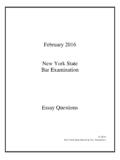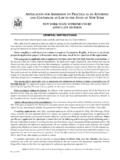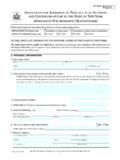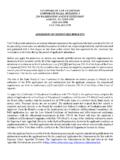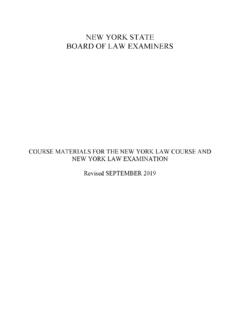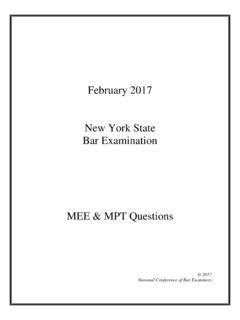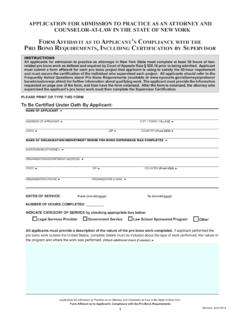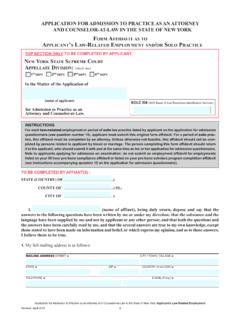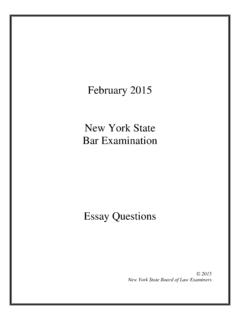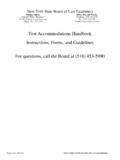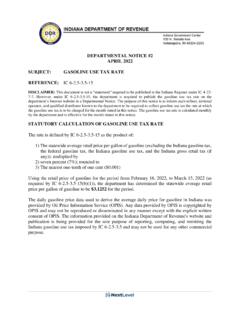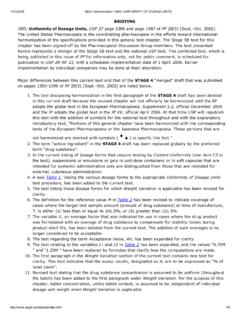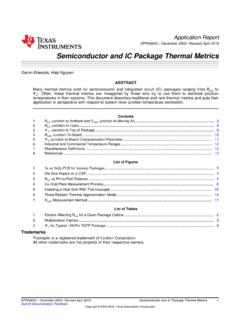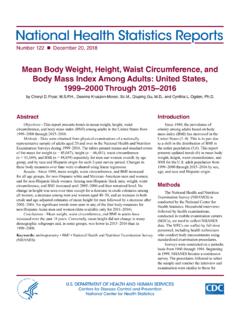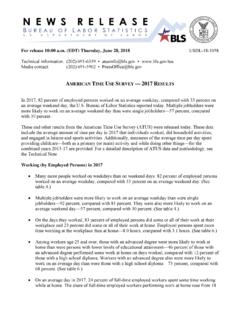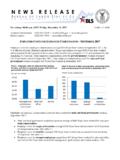Transcription of July 2016 New York State Bar Examination
1 July 2016 New york State Bar Examination MEE & MPT Questions 2016 National Conference of Bar Examiners 2016 National Conference of Bar Examiners These materials are copyrighted by the NCBE and are reprinted with the permission of NCBE. These materials are for personal use only and may not be reproduced or distributed in any way. 1 MEE 1 Two siblings, a brother and a sister, decided to start a bike shop with their cousin. They filed a certificate of organization to form a limited liability company. The brother and the sister paid for their LLC member interests by each contributing $100,000 in cash to the LLC.
2 Their cousin paid for his LLC member interest by conveying to the LLC five acres of farmland valued at $100,000; the LLC then recorded the deed. Neither the certificate of organization nor the members operating agreement specifies whether the LLC is member-managed or manager-managed. However, the operating agreement provides that the LLC s farmland may not be sold without the approval of all three members. Following formation of the LLC, the company rented a storefront commercial space for the bike shop and opened for business. Three months ago, purporting to act on behalf of the LLC, the brother entered into a written and signed contract to purchase 100 bike tires for $6,000 from a tire manufacturer.
3 When the tires were delivered, the sister said that they were too expensive and told her brother to return the tires. The brother was surprised by his sister s objection because twice before he had purchased tires for the LLC at the same price from this manufacturer, and neither his sister nor their cousin had objected. The brother refused to return the tires, pointing out that the tires are perfect for the bikes we sell. The sister responded, Well, pay the bill with your own money; you bought them without my permission. The brother responded, No way. I bought these for the store, I didn t need your permission, and the company will pay for them.
4 To date, however, the $6,000 has not been paid. One month ago, purporting to act on behalf of the LLC, the cousin sold the LLC s farmland to a third-party buyer. The buyer paid $120,000, which was well above the land s fair market value. Only after the cousin deposited the sale proceeds into the LLC bank account did the brother and sister learn of the sale. Both of them objected. One week ago, the brother wrote in an email to his sister, I want out of our business. I don t want to have anything to do with the bike shop anymore. Please send me a check for my share. 2016 National Conference of Bar Examiners These materials are copyrighted by the NCBE and are reprinted with the permission of NCBE.
5 These materials are for personal use only and may not be reproduced or distributed in any way. 2 1. What type of LLC was created member-managed or manager-managed? Explain. 2. Is the LLC bound under the tire contract? Explain. 3. Is the LLC bound by the sale of the farmland? Explain. 4. What is the legal effect of the brother s email? Explain. MEE 2 A defendant was tried before a jury for a robbery that had occurred at Jo-Jo s Bar on November 30. At trial, the prosecutor called the police officer who had investigated the crime. Over defense counsel s objection, the officer testified as follows: Officer: I arrived at the defendant s home on the morning of december 1, the day after the robbery.
6 He invited me inside, and I asked him, Did you rob Jo-Jo s Bar last night? The defendant immediately started crying. I decided to take him to the station. Before we left for the station, I read him Miranda warnings, and he said, Get me a lawyer, so I stopped talking to him. Prosecutor: Did the defendant say anything to you at the station? Officer: I think he did, but I don t remember exactly what he said. Immediately after this testimony, the prosecutor showed the officer a handwritten document. The officer identified the document as notes she had made on december 2 concerning her interaction with the defendant on december 1.
7 The prosecutor provided a copy of the document to defense counsel. The document, which was dated december 2, stated in its entirety: The defendant burst into tears when asked if he had committed the robbery. He then received and invoked Miranda rights. I stopped the interrogation and didn t ask him any more questions, but as soon as we arrived at the station the defendant said, I want to make a deal; I think I can help you. I reread Miranda warnings, and this time the defendant waived his rights and said, I have some information 2016 National Conference of Bar Examiners These materials are copyrighted by the NCBE and are reprinted with the permission of NCBE.
8 These materials are for personal use only and may not be reproduced or distributed in any way. 3 that can really help you with this case. When I asked him how he could help, the defendant said, Forget it I want my lawyer. When the defendant s lawyer arrived 30 minutes later, the defendant was released. The officer then testified as follows: Prosecutor: After reviewing your notes, do you remember the events of december 1? Officer: No, but I do remember making these notes the day after I spoke with the defendant. At that time, I remembered the conversation clearly, and I was careful to write it down accurately.
9 Over defense counsel s objection, the officer was permitted to read the document to the jury. The prosecutor also asked that the notes be received as an exhibit, and the court granted that request, again over defense counsel s objection. The testimony then continued: Prosecutor: Did you speak to the defendant any time after december 1? Officer: Following my discovery of additional evidence implicating the defendant in the robbery, I arrested him on december 20. Again, I read the defendant his Miranda rights. The defendant said that he would waive his Miranda rights. I then asked him if he was involved in the robbery of Jo-Jo s Bar, and he said, I was there on November 30 and saw the robbery, but I had nothing to do with it.
10 Defense counsel objected to the admission of this testimony as well. The court overruled the objection. The defendant s trial for robbery was held in a jurisdiction that has adopted all of the Federal Rules of Evidence. Were the following decisions by the trial court proper? 1. Admitting the officer s testimony that the defendant started crying. Explain. 2. Permitting the officer to read her handwritten notes to the jury. Explain. 3. Admitting the officer s handwritten notes into evidence as an exhibit. Explain. 2016 National Conference of Bar Examiners These materials are copyrighted by the NCBE and are reprinted with the permission of NCBE.
